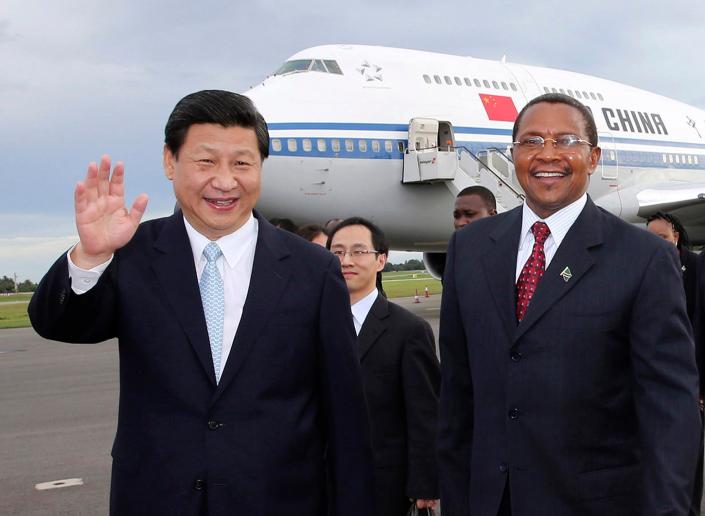The stalled US$10 billion Bagamoyo mega-port and other Chinese-funded projects are expected to top the agenda during Tanzanian President Samia Suluhu Hassan’s state visit to China from Wednesday.
China’s foreign ministry said President Xi Jinping would host a welcome ceremony and banquet for Hassan, who will be in China until November 4.
“The two heads of state will hold talks and attend the signing ceremony of cooperation documents,” ministry spokeswoman Mao Ning said on Friday.
Do you have questions about the biggest topics and trends from around the world? Get the answers with SCMP Knowledge, our new platform of curated content with explainers, FAQs, analyses and infographics brought to you by our award-winning team.
Hassan will be the first African leader to visit China since the conclusion of the Communist Party’s 20th congress in October.
Since coming to power last year following the death of president John Magufuli, Hassan has moved to improve relations with Tanzania’s neighbours as well as with major economies, including China.
Tim Zajontz, research fellow with the Centre for International and Comparative Politics at Stellenbosch University in South Africa, said both sides wanted Hassan’s visit to show that their oft-invoked “all-weather friendship is unwavering”.
While neither side would admit it officially, the years under Hassan’s predecessor had been “rather traumatic” for the Chinese, Zajontz said.
Magufuli was outspokenly critical about some Chinese practices in Tanzania and stood in the way of several high-profile projects, including the Bagamoyo mega-port, the privatisation of the Tazara railway, and Chinese investments in the mining and energy sectors.
“These projects will certainly be on the agenda during Hassan’s Beijing visit,” Zajontz said.
Work has yet to start on the Bagamoyo port and special economic zone, 65km (40 miles) north of Dar es Salaam, despite a ceremony in 2015 to officially mark its beginning.
The deal was signed in 2013 – in the presence of Xi, who travelled to Tanzania to witness the agreement soon after he became president – but stalled after a number of concerns were raised by Magufuli, including over the generous tax breaks demanded by the Chinese investor in the proposed special economic zone.
Magufuli also opposed halting the development of other maritime facilities, such as the Dar es Salaam port, while the Bagamoyo project moved ahead. And he rejected Chinese demands for a 99-year management lease on the mega-port.
Magufuli described the zone’s terms as “exploitative and awkward” and finally suspended the port project in 2019.


Chinese President Xi Jinping is greeted by his Tanzanian counterpart Jakaya Kikwete in 2013, when the Bagamoyo port deal was signed in Dar es Salaam. Photo: Xinhua alt=Chinese President Xi Jinping is greeted by his Tanzanian counterpart Jakaya Kikwete in 2013, when the Bagamoyo port deal was signed in Dar es Salaam. Photo: Xinhua>
Zajontz said negotiations with China Merchants Holdings International had resumed under Hassan, but the geopolitical and economic climate has changed significantly since Xi and then Tanzanian president Jakaya Kikwete shook hands on the deal in 2013.
“We might see the project materialising in a slimmed down version,” he said.
Zajontz said he expected the Tanzanian government would insist on maintaining control over customs and other regulatory affairs at the port and was unlikely to agree on far-reaching tax exemptions, or a 99-year lease.
Muhidin Shangwe, a political scientist at the University of Dar es Salaam in Tanzania, also said he understood the Tanzanian government had expressed interest in reviving the Bagamoyo port.
“We haven’t heard any significant progress since that was announced more than a year ago. I expect this will be top on the agenda when the two presidents meet,” he said.
Shangwe said there were additional talks to revive or upgrade the Tanzania-Zambia railway – also known as Tazara railway – from Kapiri Mposhi in Zambia to the port of Dar es Salaam built in the 1970s. “They want to upgrade it into the Standard Gauge Railway,” he said.
Construction of the central line was initially awarded to a Chinese contractor, before the deal was scrapped and given to a Turkish company. Nevertheless, Chinese contractors are involved in the last two phases of the railway.
“It is a different arrangement. The money is not coming from China but the Chinese are the contractors,” Shangwe said.
Chinese firms China Civil Engineering Construction Corporation (CCECC) and China Railway Construction last year won a US$1.3 billion contract to build the fifth phase of Tanzania’s Standard Gauge Railway (SGR) linking Mwanza – a port city on the shores of Lake Victoria – and the southern town of Isaka, 341km away.
The Tanzanian government had been trying since 2019 to secure funding for the third and fourth phases of the SGR, Shangwe said.
“There were talks with China’s Exim Bank, but the Chinese were not interested. This will be an opportunity for President Hassan to again try to convince the Chinese to finance those two phases.”
China has also opened its market to Tanzanian agricultural products such as soybeans and cassava. “It is in the interest of the Tanzanian government to seek further opportunities for its agricultural products in China in a bid to get a fair share of trade between the two countries. Trade balance is hugely in favour of China,” Shangwe said.
Hassan may also have an opportunity to revive coal and iron ore projects, first mooted about a decade ago when Tanzania signed a US$3 billion deal with Chinese firm Sichuan Hongda to develop the resources.
The deal involved construction of the Mchuchuma coal mine, development of a 600 megawatt thermal power station, and the Liganga iron ore mine. Financing hitches and a lack of previously negotiated incentives, including tax holidays, have held back the projects.
But recent developments, including a compensation agreement with those who would be displaced by the projects, could make a difference, Shangwe said.
“Given that there was Chinese interest in this area, this is an opportunity to talk to the Chinese side and probably come up with an agreement.”
Apart from infrastructure, the visit is an opportunity to strengthen party-to-party relations. “Hassan is the chair of the ruling party CCM, and Xi is the general secretary of [the Communist Party]. I am sure there will be some discussion on party-to-party relations,” Shangwe said.
David Shinn, a China-Africa expert at George Washington University’s Elliott School of International Affairs, said China and Tanzania’s especially close relationship dated back to the government of Julius Nyerere in the 1960s.
This made Hassan a good choice for the first visit to China by an African leader after the party congress. “The visit provides the leadership in Beijing an opportunity to modify its policy towards Africa in the aftermath of the congress,” Shinn said.
“For example, will the Belt and Road Initiative take a back seat to the more recent Global Development Initiative and Global Security Initiative?”
Shinn said Tanzanian agricultural exports were likely to be discussed, because of Dar es Salaam’s enormous trade deficit with China.
“The future use of the Mwalimu Julius Nyerere Leadership School sponsored by the Communist Party of China may also be on the agenda,” he said.
This article originally appeared in the South China Morning Post (SCMP), the most authoritative voice reporting on China and Asia for more than a century. For more SCMP stories, please explore the SCMP app or visit the SCMP’s Facebook and Twitter pages. Copyright © 2022 South China Morning Post Publishers Ltd. All rights reserved.
Copyright (c) 2022. South China Morning Post Publishers Ltd. All rights reserved.




